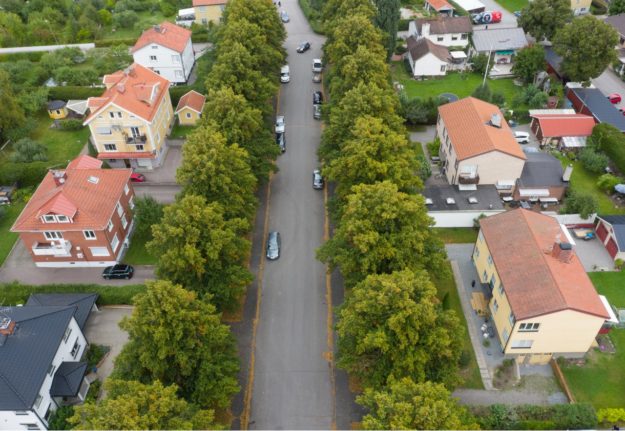How pessimistic are Swedish households?
Very.
Households’ expectations for housing prices have fallen sharply this month, with SEB’s indicator dropping eleven percentage points in July, from -16 to -27, the lowest level it has hit since the financial crisis in 2008.
The indicator, which has historically been a reliable predictor of house prices, turned negative in June for the first time since the pandemic hit in April 2020.
The indicator is calculated by subtracting of the percentage of respondents who think house prices will fall from the percentage who think they will rise.
In July, the proportion of households surveyed who expected rising prices fell to 24 percent, down from 31 percent in June, while the proportion expecting falling prices rose to 51 percent from 47 percent.
What is the reason for households’ pessimism?
Américo Fernández, SEB’s private economist, told The Local that households in Sweden had reacted strongly to the decision of Sweden’s Riksbank central bank to hike rates, with most believing that the base interest rate would rise to 1.10 percent within a year. At the same time, he said, households understood that inflation would reduce household spending power, making it harder for people to service large mortgages.
“The result is not that surprising since inflation is on its highest levels since early 1990s and interest rates are increasing rapidly,” he told The Local. “These joint factors make it much more difficult for households to consume at the same high levels, meaning that they have decrease some of their consumption, and new mortgages and houses will be on that list.”.
He said it remained to be seen whether expectations improve again rapidly, as they did at the time of the pandemic, or would remain low.
“Now the question is if this decline in expectations will turn around rapidly like during early pandemic (march/April 2020) or if it will continue in a negative slope like in the financial crisis of 2008.”
How badly has consumers’ spending power been hit by rate rises in Sweden?
According to Christina Nyman, chief economist at Handelsbanken, a major Swedish bank, rising interest rates are already weighing on consumers’ buying power.
“For a household with loans of SEK 3m, this translates to additional costs of SEK 3,300 per month, which we believe is putting a cap on other consumption,” she said of the Riksbank’s rate increases so far.
She warns in the bank’s most recent Global Macro Forecast that if the Riksbank speeds up its rate hikes, it could lead to a proper recession in Sweden.
“An acceleration of the rate-hike program could result in a drop in housing prices and a more severe recession,” she said.
Are we going to see a housing crash?
To qualify as a housing crash, home prices need to plummet by at least 15%, something which has not happened in Sweden since the 2008 financial crisis when prices in Sweden fell by as much as 20%, before rebounding gradually over the following years.
So far, it looks more like house prices in Sweden are set to decline more gradually, as there has been no new shock such as a stockmarket crash or banking crisis.
How are homeowners responding?
According to SEB’s report, 12 percent of households who currently have a fluctuating rate mortgage said in July that they are now planning to move to a fixed rate mortgage to avoid being hit by further rate hikes from the Riksbank, an increase of one percentage point from the June survey.
The proportion who say they have already fixed the rate on their mortgage has risen by four percentage points to 37%.
How might the average person be impacted?
Future buyers will profit from a drop in prices, despite all the suffering that frequently precedes a property catastrophe. On the other hand, the crash could be catastrophic for homeowners because they might have to sell their homes for less than what they paid.
Families who are forced to sell because they cannot afford their mortgage payments, for instance, or those who experience unemployment or illness, may therefore suffer significant capital losses.




 Please whitelist us to continue reading.
Please whitelist us to continue reading.
Member comments